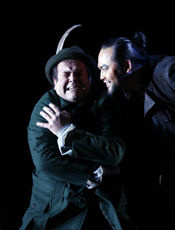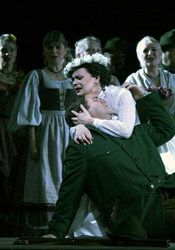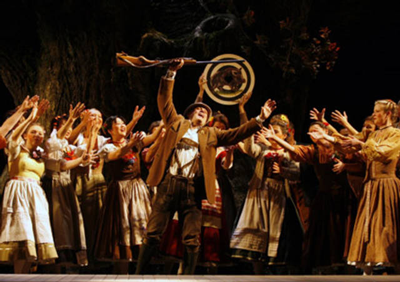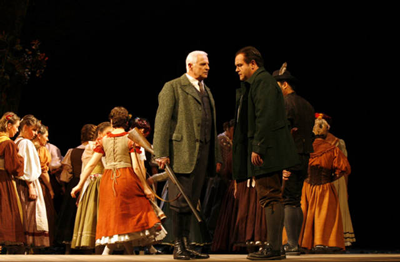
24 Oct 2007
Der Freischütz at Oper Köln
Do you remember a moment when a piece, new to you, so engaged you that you immediately wanted to know more. . .or all about it?
English Touring Opera are delighted to announce a season of lyric monodramas to tour nationally from October to December. The season features music for solo singer and piano by Argento, Britten, Tippett and Shostakovich with a bold and inventive approach to making opera during social distancing.
This tenth of ten Live from London concerts was in fact a recorded live performance from California. It was no less enjoyable for that, and it was also uplifting to learn that this wasn’t in fact the ‘last’ LfL event that we will be able to enjoy, courtesy of VOCES8 and their fellow vocal ensembles (more below …).
Ever since Wigmore Hall announced their superb series of autumn concerts, all streamed live and available free of charge, I’d been looking forward to this song recital by Ian Bostridge and Imogen Cooper.
Although Stile Antico’s programme article for their Live from London recital introduced their selection from the many treasures of the English Renaissance in the context of the theological debates and upheavals of the Tudor and Elizabethan years, their performance was more evocative of private chamber music than of public liturgy.
Evidently, face masks don’t stifle appreciative “Bravo!”s. And, reducing audience numbers doesn’t lower the volume of such acclamations. For, the audience at Wigmore Hall gave soprano Elizabeth Llewellyn and pianist Simon Lepper a greatly deserved warm reception and hearty response following this lunchtime recital of late-Romantic song.
For this week’s Live from London vocal recital we moved from the home of VOCES8, St Anne and St Agnes in the City of London, to Kings Place, where The Sixteen - who have been associate artists at the venue for some time - presented a programme of music and words bound together by the theme of ‘reflection’.
'Such is your divine Disposation that both you excellently understand, and royally entertaine the Exercise of Musicke.’
‘And there was war in heaven: Michael and his angels fought against the dragon; and the dragon fought and his angels, And prevailed not; neither was their place found any more in heaven … that old serpent … Satan, which deceiveth the whole world: he was cast out into the earth, and his angels were cast out with him.’
There was never any doubt that the fifth of the twelve Met Stars Live in Concert broadcasts was going to be a palpably intense and vivid event, as well as a musically stunning and theatrically enervating experience.
‘Love’ was the theme for this Live from London performance by Apollo5. Given the complexity and diversity of that human emotion, and Apollo5’s reputation for versatility and diverse repertoire, ranging from Renaissance choral music to jazz, from contemporary classical works to popular song, it was no surprise that their programme spanned 500 years and several musical styles.
The Academy of St Martin in the Fields have titled their autumn series of eight concerts - which are taking place at 5pm and 7.30pm on two Saturdays each month at their home venue in Trafalgar Square, and being filmed for streaming the following Thursday - ‘re:connect’.
The London Symphony Orchestra opened their Autumn 2020 season with a homage to Oliver Knussen, who died at the age of 66 in July 2018. The programme traced a national musical lineage through the twentieth century, from Britten to Knussen, on to Mark-Anthony Turnage, and entwining the LSO and Rattle too.
With the Live from London digital vocal festival entering the second half of the series, the festival’s host, VOCES8, returned to their home at St Annes and St Agnes in the City of London to present a sequence of ‘Choral Dances’ - vocal music inspired by dance, embracing diverse genres from the Renaissance madrigal to swing jazz.
Just a few unison string wriggles from the opening of Mozart’s overture to Le nozze di Figaro are enough to make any opera-lover perch on the edge of their seat, in excited anticipation of the drama in music to come, so there could be no other curtain-raiser for this Gala Concert at the Royal Opera House, the latest instalment from ‘their House’ to ‘our houses’.
"Before the ending of the day, creator of all things, we pray that, with your accustomed mercy, you may watch over us."
The doors at The Metropolitan Opera will not open to live audiences until 2021 at the earliest, and the likelihood of normal operatic life resuming in cities around the world looks but a distant dream at present. But, while we may not be invited from our homes into the opera house for some time yet, with its free daily screenings of past productions and its pay-per-view Met Stars Live in Concert series, the Met continues to bring opera into our homes.
Music-making at this year’s Grange Festival Opera may have fallen silent in June and July, but the country house and extensive grounds of The Grange provided an ideal setting for a weekend of twelve specially conceived ‘promenade’ performances encompassing music and dance.
There’s a “slide of harmony” and “all the bones leave your body at that moment and you collapse to the floor, it’s so extraordinary.”
“Music for a while, shall all your cares beguile.”
The hum of bees rising from myriad scented blooms; gentle strains of birdsong; the cheerful chatter of picnickers beside a still lake; decorous thwacks of leather on willow; song and music floating through the warm evening air.

Do you remember a moment when a piece, new to you, so engaged you that you immediately wanted to know more. . .or all about it?
I can recall, as a student, hearing a guest concert by the Bavarian Radio Symphony in Chicago’s Orchestra Hall that opened with Carlos Kleiber leading a thrilling reading of the overture to Weber’s “Der Freischütz.” (Every chestnut was once new to those who hadn’t heard it before, right?)
After this “teaser,” I discovered that the whole opera was not only under-represented on recordings at the time, but also that in America it was hardly ever seen at all, remaining more talked about than performed. The reason for the neglect of this “first German opera” is perhaps partly because of extended dialogue scenes which have trouble making their effect in cavernous theatres; partly because of a pervading mysticism that can seem rather silly today (except maybe to adherents of L. Ron Hubbard); and the notoriously difficult staging demands needed to credibly bring off the rather clunky dramaturgy of the “Wolf’s Crag” scene (which can so easily become so very cheesy).
More’s the pity that it is so rarely attempted, because I find much of the music sublime, that is, if you have the singers to meet its challenges. And therein perhaps lies the real reason for its neglect, since there are certainly other pieces that are dialogue heavy and dramatically “challenging” that get regular mountings (“Die Zauberflöte” comes to mind). Weber’s opus not only requires a hero and heroine with sizable, flexible heroic voices, but a bass-baritone with chords of steel. All are called upon to maintain a mounting and plausible tension in the plentiful dialogue.
Happily, in Germany, “Freischütz” is attempted much more often, though still not nearly with the frequency of other mainstream masterpieces. In my experience the two separate Frankfurt productions (one memorable only for a terrific Angela Denoke, the other for the goofiness of having the hunters got-up as Hassidic Jews); the Achim Freyer version in Stuttgart (which others liked much more than I); and even a well-meant staging in Seattle with (a slightly mis-cast) Deborah Voigt; all left me admiring individual components but none adding up to a total package. Until now.

Cologne Opera has unveiled a new staging under the sure direction of Michael Heinicke, with a pleasing traditional set and costume design by Jens Kilian, all quite beautifully lit by Hans Toelstede. Just when you thought you may never see the like again, here is a “take” with - *gasp* - actual pretty dirndls and proper-looking hunters, and a huge, gorgeous, many-branched tree that fills the stage. In the first flush of fall, its leaves just turning, and beautifully lit, it elicited gasps at curtain rise. “Agathe’s” room was a skeletal “wall” frame of 4 X 4's, sparsely furnished, through which the ever-present tree kept nature smack at the center of things.
Mr. Heinicke is an unfussy director who, blessedly, does not seem to need to impose much of anything but common sense and strong stage pictures onto the piece. Almost everything and everybody is what or who they are supposed to be. He has elicited sincere and affecting performances from an excellent cast. However, perhaps out of obligation to do something “modern,” there are one or two moments when “Freischütz” misfires.
Just after Max loses the initial shooting contest, the taunting chorus is suddenly joined by a sextet of actual pit musicians, playing onstage in their concert attire, who join in tormenting him. Too, there is a piece of business in which “Agathe” pretends to play a cello as accompaniment to “Ännchen’s” aria. She is so clearly not playing it that it only distracts. And, in a “what-does-that-mean?” moment, “Ännchen” places the flower arrangement on the lip of the stage mid-Act I, next to the prompter’s box, where it remains until picked up again when the flowers are required in Act II. I would hope that some consideration would be given to tweaking these jarring bits, because for the rest of the evening I thought the staging had most everything one could want.
The acting was not only believable, but for once the declamation was not of the phoney- baloney Dudley Do-Right School of Operatic Elocution. “Samiel” (Joachim Berger) was a looming and evil omni-presence who eerily appeared up in the crook of the tree, evaporated into the darkened background at will, and attempted complete control over the turns-of-events, including a sinister hovering during “Agathe’s” second act aria. The “Hermit” (Wilfried Staber) too had several silent and mysterious appearances long in advance of his usual sung entrance late in Act II.
The fine young Croatian baritone Miljenko Turk (wonderful as “Billy Budd” last season) brought beauty of tone and attractive demeanor to “Ottokar.” Katharin Leyhe’s “Ännchen” was not just the usual chirpy kewpie doll, but had a tall, solid physique du role and brought some welcome starch to her characterization, producing some lovely lyric singing in the bargain. Venerable bass Ulrich Hielscher made a perfect fatherly “Kuno.” He was also feted at curtain call for his 30 years service with the company, by being made a “Kammersaenger.”

Lithuanian soprano Ausrine Stundyte had just the right amount of heft and metal in her pleasing sound to make a winning Agathe. The hushed “Leise, leise” was beautifully internalized, and the soaring stretto section delivered all the goods. She was totally committed to the Nervous Nellie characterization that was asked of her. Indeed, I thought she was going to have a nervous breakdown in several moments -- at least I hope she was acting! (It was reminiscent of Judy in her later years. . .)
Thomas Mohr was a splendid Max. While his firm lower-voiced singing displays some signs of his former life as a baritone, the top rings true, his sense of line is commendable, his dramatic commitment is effectively varied, and he poured out beautiful sound all night long in all registers. We may have gotten spoiled, wishing every leading tenor could look like Juan Diego Florez or William Burden, and that Mr. Mohr does not. But he exuded a genuine, conflicted appeal nonetheless, albeit more in the Paul Giamatti mode.
The knockout performance this night came from the completely mesmerizing, thrillingly sung “Kaspar” of Korean bass Samuel Yuon. His focused, steely tone cut through the orchestra with ease, and his fiery melismatic work was right on the money. Moreover, he avoided every cliche that has encumbered this role in the past with acting of amazing nuance. Even the sometimes hokey asides of “Hilft, Samiel” hit their mark. His star turn in the “Wolf’s Crag” conjuring scene was awesome. I should add that he was ably abetted by some very good, strobe-like lighting effects which made the static tree actually seem to move about.

Memory having the ennobling effect that it does, I suppose nothing will ever completely over-ride my first happy encounter with the opera’s overture those many years ago. But I found Enrico Delamboye’s conducting to be very well-considered overall. He favored faster tempi than some, with the bridesmaid’s tune and a couple of the choruses especially quick-paced. There was a brief scrappy moment or two, like the opening bars of the overture’s first agitato and a slight hiccup in the opening chorus. But even in the relatively dry acoustic of the Cologne house, the Guerzenich Orchestra, chorus and cast responded to him with often expansive, always persuasive Romantic music-making of a very high order.
If you, too, have longed for an encounter with the best of all possible performances of “Der Freischütz,” well, this could very likely be the one you’ve been waiting for.
James Sohre